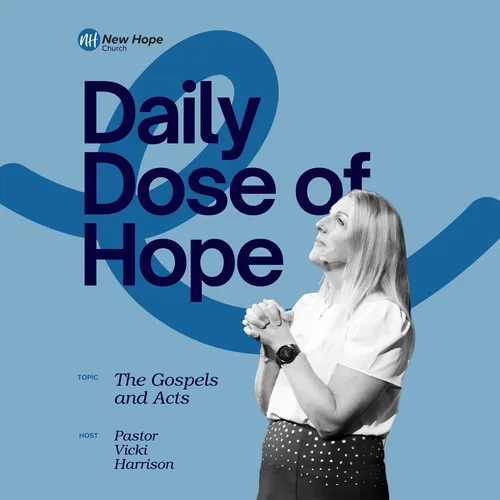September 8, 2025; Luke 16:19-31
- Author
- Rev. Vicki Harrison
- Published
- Mon 08 Sep 2025
- Episode Link
- https://sites.libsyn.com/240911/september-8-2025-luke-1619-31
Daily Dose of Hope
September 8, 2025
Scripture - Luke 16:19-31
Prayer: Heavenly Father, We come to you today rejoicing in your holy name. You are such a good God. It’s so hard for us to conceive that the God who put the stars in the sky and put the planets into motion is the same God who loves us and has numbered the hairs on our heads. We thank you so much for your love and care. Open our minds and hearts as we approach your Word today. Help us hear a word from you. How we yearn to hear from you, Lord. We need you. Over and over again, we need you. In Your Name, Amen.
Welcome back, everyone, to the Daily Dose of Hope, the devotional and podcast that complements the New Hope Church Bible reading plan. We are currently doing a deep dive into the Gospels and Acts and today we are deep diving into the second half of Luke 16. Let’s get to it.
Today’s text is not an easy one – the parable of destitute Lazarus and the rich man. It follows a series of parables – the lost coin, the lost son, and the shrewd manager - which deal with some aspect of money and how money affects our relationship with God and other people. Today’s parable focuses on how wealth comes great responsibility.
A brief review: Lazarus is impoverished with sores all over his body. He lays at the rich man’s gate but never receives anything from the rich man. The only mercy shown to him is by the dogs who lick his wounds. Both men die. Lazarus ascends to Abraham’s table, which we can assume is heaven, where he is cared for and finally eats well. The rich man is doomed to spend eternity in Hades, where he will be in eternal torment. The rich were not normally tortured while living; they lived well, ate well, dressed well, and had a comfortable roof over their head. In life, it was the poor and enslaved who suffered torture. In fact, the legal testimony of an enslaved man was only received and considered truthful under torture.
The rich man gets a glimpse of Abraham in heaven and begs for mercy, the mercy that he denied Lazarus and Abraham refuses. And when the rich man asks Abraham to warn his family so their fate wouldn’t be the same as his, he refuses as well. According to Father Abraham, they should know the right way to live simply by listening to the prophets.
There are many different directions we could go with this parable. A lot of people want to understand what is meant by rich and poor in this story. How rich is considered rich? Are we rich? Compared to Lazarus who has nothing, we are all rich. And the reality is that there are many with nothing in our world. They may not sit by our personal gates, but they exist. They are real human beings. The parable implies that the rich man should have done something different to avoid his fate. He should have helped. He should have offered the man something. There is plenty of room for imagining what a faithful response would have been for this man.
Regardless of whether we fall into the rich or poor category, we need to remember to keep Lazarus at the center. This rich man saw Lazarus every single day. He was laying outside his gate. But he never saw him until it was much too late. Who represents Lazarus in our life? Do we see them? Do we really see them?
The danger here is not really in our wealth, but in becoming complacent, self-righteous, or unloving in our wealth. All we have is a gift from God. But our resources can become a huge snare for us if we fail to remember where our gifts come from. And the one who has blessed us with the resources has an expectation for how we use them.
This reminds me of Jesus’ visit to Zaccheaus, the wee little man who was also a rich tax collector. In Jesus’ discussions, Zaccheaus is convicted and decides to give away half his possessions to the poor and to make restitution to the people for whom he took advantage. Salvation came to Zacchaeus while he was still alive and he shows himself to be a son of Abraham.
Jesus came to call people to repentance. “Repent, for the Kingdom of God is near,” was one of the earliest parts of his message. Repentance is always possible during one’s lifetime. To those who earnestly repent, there is hope.
Blessings,
Pastor Vicki
